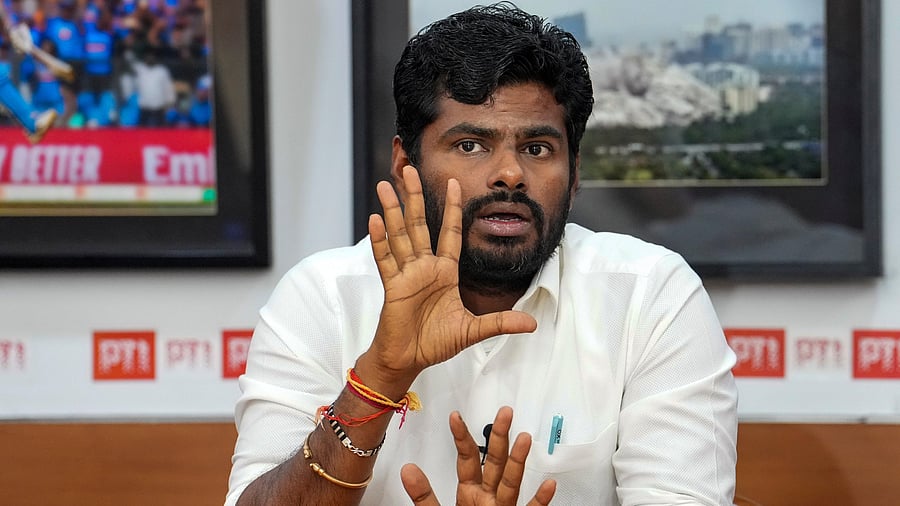
Tamil Nadu BJP chief K Annamalai.
Credit: PTI File Photo
Tamil Nadu BJP chief K Annamalai has doubled down on the party’s support for the three-language policy and the upcoming delimitation exercise, positioning the BJP at odds with the state’s political mainstream—even its own allies.
As Chief Minister M K Stalin casts the 2026 elections as a battle between Tamil Nadu and the Centre, BJP finds itself increasingly isolated as its position on these issues could shape its political future in the state, where language has long been more than just an academic concern but a deeply entrenched cultural and political battlefront.
The PMK, its only major ally, has broken ranks, joining an all-party meeting against delimitation and reaffirming its opposition to the three-language policy, seeing it as a veiled attempt to impose Hindi.
With the AIADMK too deciding to participate in the meeting, many including party insiders observe that the BJP’s stance on language and representation risks alienating voters and fracturing the coalition it built for the 2024 elections. This has left the BJP politically adrift as the 2026 assembly elections approach.
“Let all parties be on one side. The BJP will stand alone on this issue,” Annamalai declared recently, forcefully advocating for the implementation of the contentious three-language policy in a state that has long adhered to a two-language formula of Tamil and English. Annamalai also accused Stalin of “imagining” that Tamil Nadu would lose parliamentary seats when the Union government takes up the Delimitation exercise in 2026.
Stalin, who has raised these concerns almost daily, is positioning the 2026 electoral battle as Tamil Nadu versus Centre, a strategy that has put the BJP in an uneasy spot.
The BJP’s stance on language and delimitation—issues on which the DMK has painted it as the villain—could prove costly as the elections near. Already, the PMK is reportedly exploring an alliance with the AIADMK to secure the re-election of its chief, Anbumani Ramadoss, to Rajya Sabha.
“Politically, the BJP is isolated in Tamil Nadu,” political analyst Maalan Narayanan told DH.
“The party is bound to support the three-language policy and the National Education Policy (NEP), but its stance risks alienating alliance partners. The AIADMK has already made it clear that it will not ally with the BJP. The party must recognise that there is now a third option for smaller political groups in Vijay,” he added.
Narayanan also said the DMK’s aggressive stand on both issues would make other parties distance themselves from the BJP as they don’t want to be seen as working against the “interests of the state.” “Even if these parties can’t ally with the DMK, they may have to toe its line politically,” he added.
The BJP’s backing of the three-language formula is unsurprising at the national level, but it marks a departure from Annamalai’s earlier attempts to “Dravidianise” the party in an effort to gain traction in Tamil Nadu. At one point, Annamalai himself had said he would be the first to raise his voice if Hindi was imposed on the state and even identified as a Dravidian.
However, the state unit’s current messaging focuses on the DMK leadership, pointing out that many of its leaders operate CBSE schools where students study multiple languages.
The BJP is seeking to highlight what it sees as an inconsistency: Why should “children of the rich” learn three languages while students in government schools are limited to Tamil and English? The party has also been vocal in questioning why none of the children of the CM, his ministers, or lawmakers study in schools that follow the two-language formula.
By arguing that the three-language policy does not necessarily mean Hindi alone, the BJP hopes to build support for the idea and convince people of the benefits of learning additional languages. However, even its allies remain unconvinced, fearing that any move toward a three-language policy inevitably introduces Hindi into the state’s education system.
A closer look at Kendriya Vidyalayas in Tamil Nadu underscores these concerns—more than 50 schools lack Tamil teachers, while every institution has Hindi instructors, and at least 15 employ Sanskrit teachers.
Proponents of Hindi have attempted to make a case for its necessity by citing everyday situations—arguing, for example, that knowing Hindi helps in conversing with street vendors selling 'pani puri' in Tamil Nadu or in reading signboards while travelling in northern India. But such justifications have done little to bolster the BJP’s position.
The party has also pointed to an increase in Tamil Nadu students opting for CBSE schools as evidence that there is a growing interest in learning Hindi. But critics argue that this assumption is flawed—parents typically enrol their children in CBSE schools to ensure stronger foundations in science and mathematics, not for language instruction. The state’s Samacheer Kalvi (Universal Education) system, which many believe lacks academic rigour, is also a factor in the preference for CBSE institutions.
Of the 58,000 schools in Tamil Nadu, only 1,835 follow the CBSE syllabus, while the rest—including 12,690 private matriculation schools—do not offer Hindi instruction. Only 3.16 percent of the state’s schools teach Hindi.
Senior journalist R Bhagwan Singh told DH that BJP should learn from the history that saw Congress being “dumped” by the people of Tamil Nadu in 1967 after it attempted to impose Hindi. “The BJP might have to pay a heavy price politically as language is still a highly sensitive issue in the state. Language unites Tamil like no other subject,” he added.